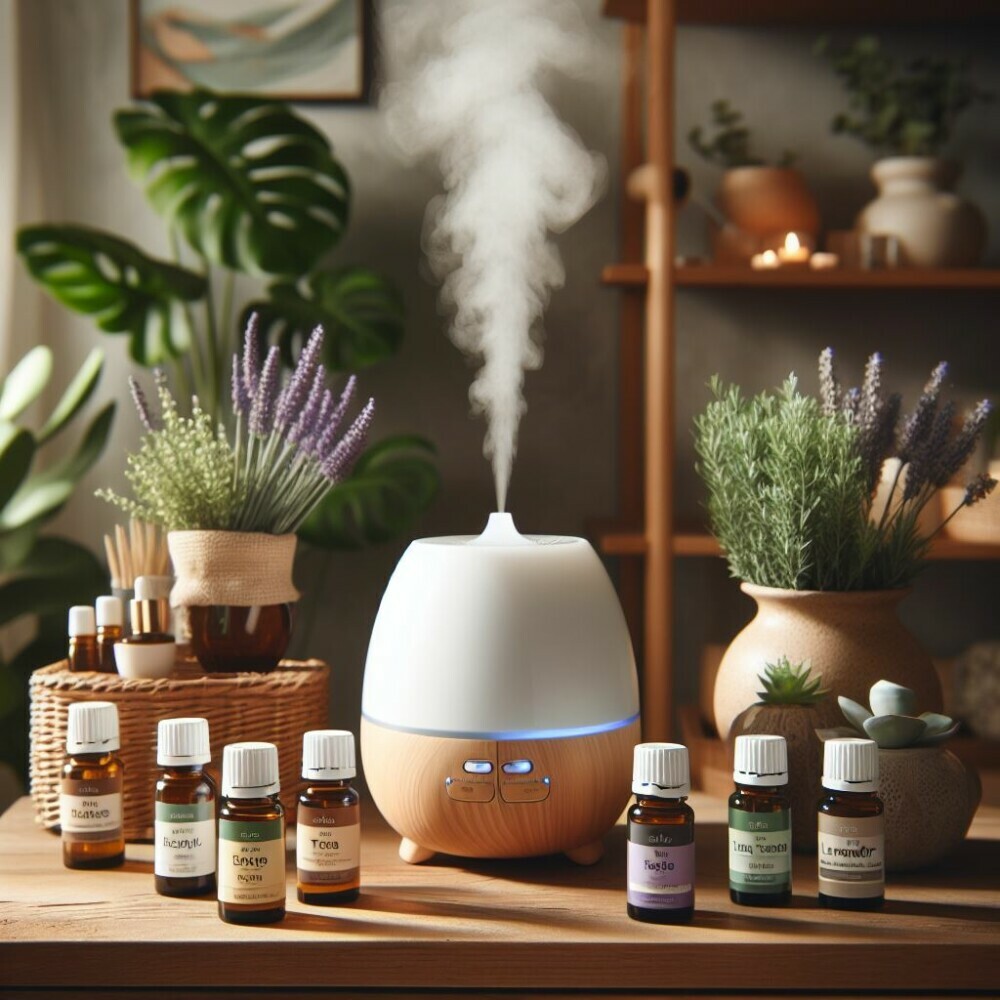
Table of Contents
Introduction
Your respiratory system is your body’s VIP—it’s how you get oxygen in and send carbon dioxide out. But when it’s not working its best, you might face issues like asthma, allergies, or just the common cold.
That’s where essential oils come in. Benefits of essential oils for respiratory health are well documented and go back many centuries. Extracted from the very essence of plants, these oils have been used for centuries to aid in health and healing, including respiratory relief. They contain compounds that some studies suggest can help open airways and combat pathogens. Another benefit of incorporating these essential oils for our respiratory health is that they don’t have side effects unlike traditional medicine.
But it’s not just about breathing better. Essential oils can also improve your overall sense of well-being. Many people find that different scents can energise, relax, or uplift them emotionally, which can indirectly influence their respiratory health.
Now, essential oils aren’t new on the scene. Dating back to ancient civilizations, they’ve found their way into traditional medicine practices from all corners of the world. The Egyptians, Greeks, Chinese, and Indians—they all tapped into the power of aromatherapy for maintaining good health.
So, how does this all come together for your lungs? Inhaling the aromas from essential oils can help support the delicate tissues of the respiratory tract. Think of them like a natural, fragrant aide that might just make you feel like taking a deep breath is a little bit easier.
The Scent of Relief: How Essential Oils Can Support Respiratory Health

You’re going to find out about how these fragrant wonders can be much more than simple pleasantries. Essential oils, when used correctly, can offer support for respiratory health. Let’s break down the science behind this age-old remedy, starting with the basic ‘how’ they interact with our body’s systems.
Essential oils are plant extracts, capturing nature’s complex array of aromatic compounds. When inhaled, these compounds can interact with the olfactory system and eventually the lungs, sometimes offering decongestant or anti-inflammatory properties. Think of essential oils like eucalyptus and peppermint, known for opening up airways, or oregano oil, which has been studied for its antimicrobial qualities.
But it’s not just about individual oils; it’s also about understanding the broader spectrum. For example, some oils can help soothe coughs or promote the feeling of easier breathing by relaxing the muscles around the airways. The idea is to target the symptoms but also support the body’s own healing processes.
Safety is non-negotiable here. Using essential oils for respiratory health involves practical knowledge about dilution ratios, application methods, and recognizing high-quality oils. You don’t want to learn through trial and error when it comes to your wellbeing, so later we’re going to carefully walk through these safety guidelines.
Now, as we transition to professional and user experiences with essential oils, remember: expertise and personal anecdotes can shed light on the suitability of essential oils for respiratory troubles. The real-world application of these natural tools often provides insights that can complement scientific findings.
Personal Experiences and Professional Guidance: Why Expert Opinion Matters

In my opinion, the voice of experience is invaluable, especially when it comes to integrating something like essential oils into your respiratory health routine. I’m going to share stories from individuals who have found a breath of fresh air through these natural remedies.
You’re going to find out about Mary, who after years of seasonal allergies, finally got relief during the high-pollen spring months by diffusing eucalyptus and peppermint oil. And then there’s Tom, whose nightly routine involving lavender oil has helped him manage his asthma symptoms better.
It’s not just anecdotal evidence that points to the potential benefits of essential oils for respiratory health; medical professionals and aromatherapy experts have a lot to say on the matter. For instance, studies have shown that certain essential oils may possess anti-inflammatory properties, which can aid in reducing airway inflammation.
So, where do you go to get trusted information and quality products? That’s an important question. I recommend seeking advice from certified aromatherapists or healthcare providers who understand the nuances of essential oils and can provide guidance based on your health history and needs.
Choose something that resonates with you, but also carries the weight of expert endorsement. For every heartening story from Mary or Tom, there’s professional backing that gives us more confidence in the role of essential oils in respiratory care.
To seamlessly transition into our next topic, it’s worth noting that having the right blend of essential oils can be just as crucial as the individual oils themselves. It’s about creating harmony in your herbal repertoire. This is where blending comes into play, which we’re going to explore further in the next section, ‘Herbal Harmony: Blending Essential Oils for Maximum Respiratory Benefit.’
Herbal Harmony: Blending Essential Oils for Maximum Respiratory Benefit

When you enter the world of essential oils, you’re not just choosing individual scents. You’re unlocking the potential of combining them to create powerful blends that can maximize the benefits for your respiratory system.
I’m going to kick things off by introducing you to the art of blending essential oils for synergistic effects. Think of it as creating a team where each player has a specific role, contributing to the overall strength and effectiveness of the group.
You’re going to find out about some tried-and-true recipes that have made a real difference for those dealing with respiratory issues. These blends are crafted to help you combat congestion, soothe irritations from allergies, and provide a comforting sensation during those pesky colds.
If you want to experiment more, choose something that resonates with you. I’ll offer tips on how to craft your respiratory-supporting oil blend at home. Remember, your blend should be like your fingerprint – unique to you and your needs.
Don’t worry too much about getting it perfect on the first try. You can always adjust your blend down the road. This is about exploration and finding what provides you with the most relief and pleasure.
Integrating Essential Oils into Your Health Routine Responsibly

You’re going to find out about harmonising your health practices with the inclusion of essential oils for respiratory support. This isn’t just about using essential oils because they smell good; it’s also about adopting them as a complementary approach to promote overall lung wellness.
In my opinion, it’s critical to remember that essential oils are potent, and their effectiveness is rooted in their responsible use. Choose something that resonates with you and your lifestyle, but always prioritise safety. That means knowing when to diffuse, inhale, or apply topically, as well as recognising when to consult with a healthcare professional.
Don’t worry too much about needing to use essential oils every day or in large quantities. Sometimes, less is more, and even occasional use can provide benefits. You can always adjust your approach down the road as you become more attuned to what works best for your body.
A lot of opportunity in essential oils lies in their versatility, but this also means there’s a responsibility to use them wisely. Stay informed about possible interactions with medications or conditions and get to know the quality of the oils you select.
Your first attempt doesn’t need to be your last. Feel free to experiment with different oils and methods to find the most pleasant and effective routine for you. Just don’t focus too much on perfection; it’s the regular and thoughtful integration of these oils into your life that can lead to the real respiratory rewards.
I hope that you’ve gained valuable insights throughout this exploration into essential oils for respiratory health. If you have any questions or experiences to share, I’d love to hear your feedback. Remember, the journey to better health is always evolving, and essential oils could be a fragrant and beneficial part of yours.
Kaleem,
greenlifehub.com


Hi your exploration of essential oils for respiratory health is quite thorough and well-rounded. It highlights the potential benefits of these oils, rooted in both historical practices and modern science, and emphasizes the importance of safe and informed use. Here are a few questions:
1. How have ancient civilizations adapted essential oils for respiratory health, and how do these practices compare to modern usage?
2. What specific studies have demonstrated the efficacy of essential oils like eucalyptus or peppermint in relieving respiratory issues?
3. What are the most common misconceptions about the safety of essential oils, and how can users ensure they’re using them responsibly?
Thanks Lewis
Hi Lewis,
Thank you for your thoughtful feedback and excellent questions! Here are the answers:
1. Ancient civilisations like Egypt and China used essential oils through inhalation and topical applications. Modern usage mirrors these methods but benefits from advanced extraction techniques and scientific validation.
2. Studies have shown that essential oils can help with respiratory issues however, they must be used with caution. Please refer to following articles:)
i – https://www.ncbi.nlm.nih.gov/p…
ii – https://www.healthline.com/hea…
3. Common misconceptions include assuming all essential oils are safe for everyone. Users should dilute oils properly and consult with healthcare professionals, especially for children or those with health conditions.
Thanks again for your questions and engagement!
Best regards,
kaleem